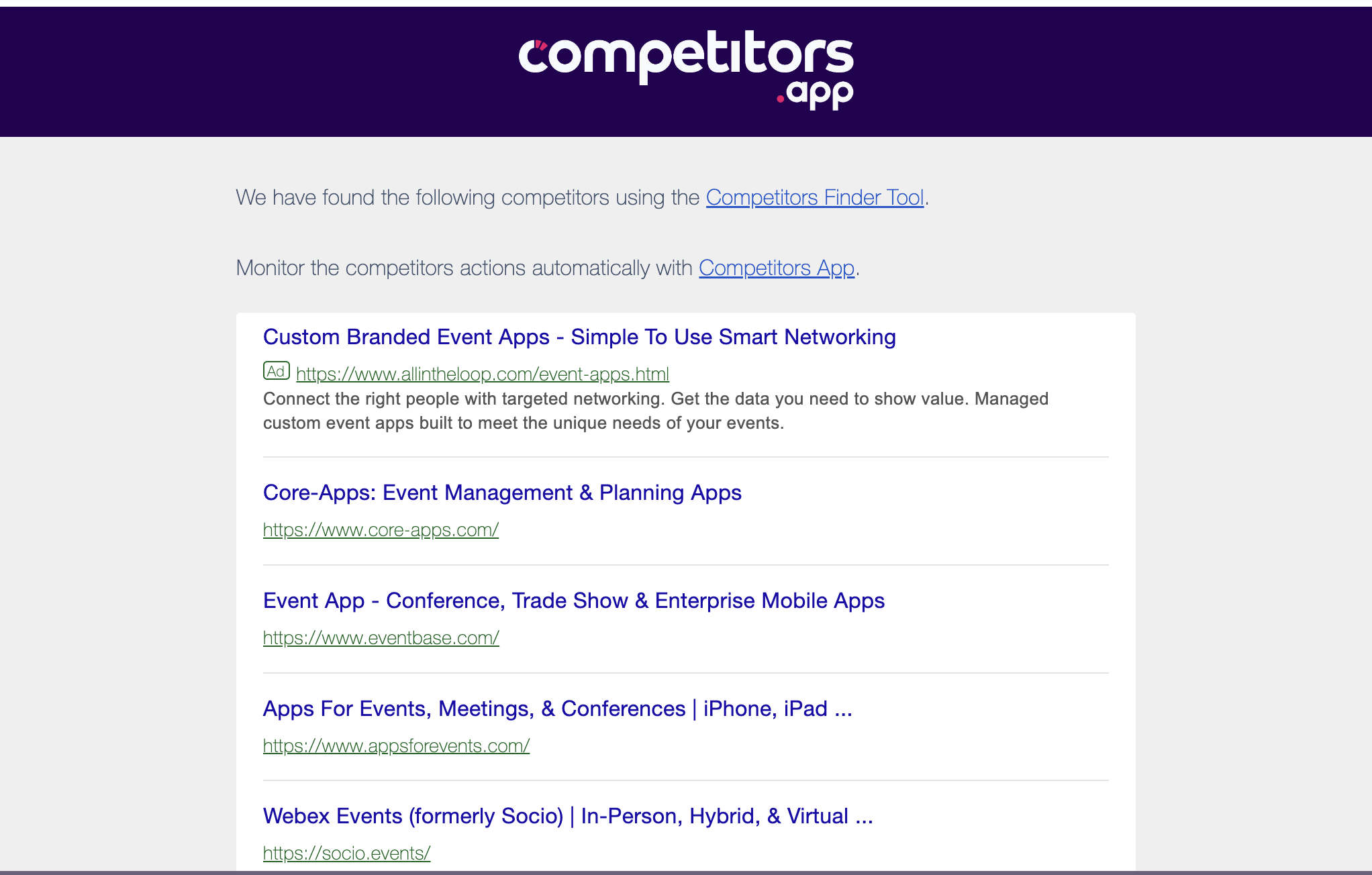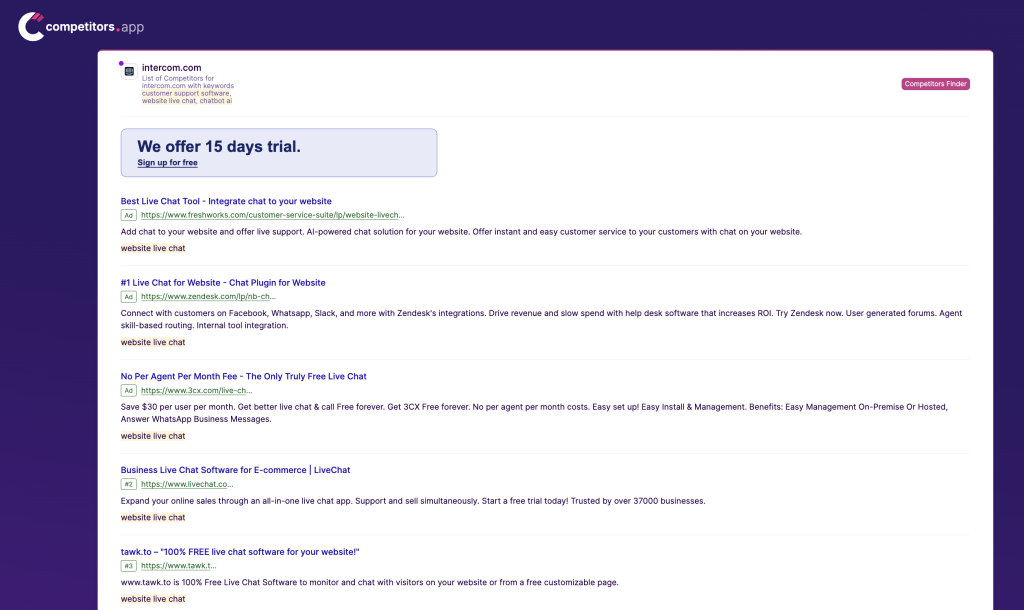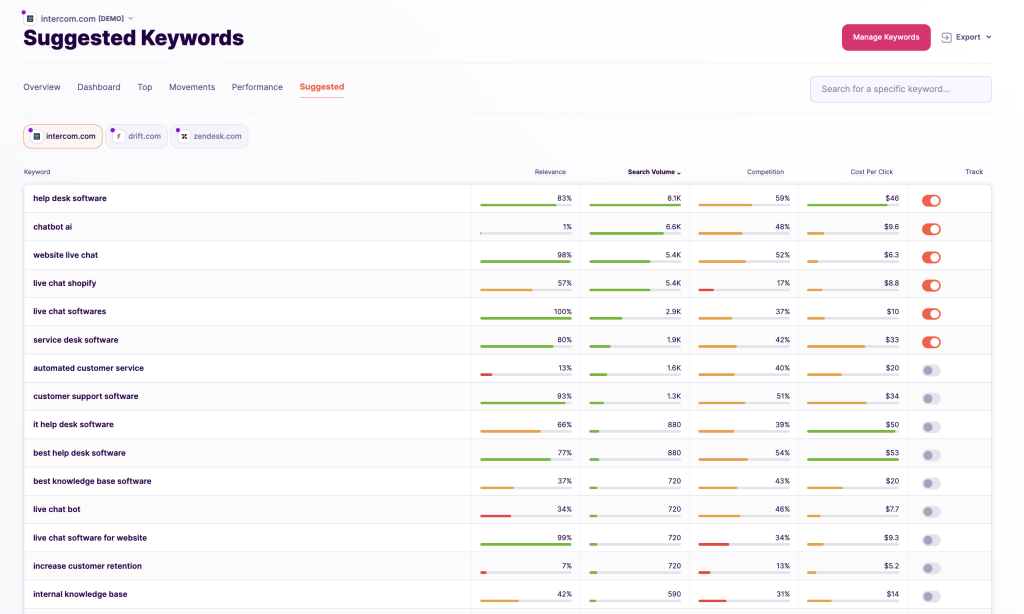Find Your SEO & PPC Competitors FAST With AI!
In today's fiercely competitive business landscape, can you truly afford to ignore your rivals? Understanding your competitors is not just an advantage; it's a necessity for survival and sustained growth.
The digital realm has ushered in an era where information is readily available, yet the sheer volume can be overwhelming. The tools and techniques for competitor analysis have evolved, moving beyond simple observation to sophisticated data-driven insights. This is the new battlefield, and understanding your opponent is crucial for success.
Let's delve deeper into the world of competitor analysis. The core goal is to gain actionable insights into what other businesses are doing, the strategies they employ, and, most importantly, how you can leverage this knowledge to outperform them. This means identifying not just who they are, but also how they're attracting customers, what keywords they target, and how they're positioning themselves in the market.
- Movierulz 2023 Download Risks Safe Movie Alternatives
- Hdhub4u Free Movie Downloads Risks Alternatives In 2024
One of the most immediate steps in competitor analysis is identifying who your competitors even are. This isn't always straightforward. They may not be the companies you immediately think of. Consider the online travel industry, where established players like Expedia and Booking.com compete not just with each other, but also with meta-search engines like Google Flights and Skyscanner, as well as newer platforms offering unique travel experiences.
Various free and paid tools are available to simplify this complex process. Many SEO tools offer "competitor finder" functionalities, allowing you to enter your own domain or niche keywords to generate a list of businesses vying for the same audience.
Once you've identified your competitors, it's time to dissect their online presence. This involves several key areas:
- Movierulz Film Rankings What You Need To Know Stay Safe
- Enjoy Hindi Dubbed Movies In 2024 Where To Watch Legally Safely
- Keyword Analysis: This is where you discover what terms your competitors are targeting in their content and advertising campaigns. Understanding their keyword strategy reveals their target audience and the topics they emphasize.
- Backlink Analysis: Backlinks are like votes of confidence from other websites. By analyzing your competitors' backlinks, you can identify valuable resources that they use to build authority. You can find opportunities to build your own authority and reach the same audience.
- Traffic Sources: Knowing where your competitors' traffic comes from allows you to understand which marketing channels they are using to attract customers. This insight can inspire your own strategies to reach similar audiences.
- Advertising Strategies: Pay-per-click (PPC) advertising is expensive. Understanding the keywords, ads, and landing pages your competitors use gives you an edge in this battleground.
- Content Analysis: Content marketing is key to attract and engage your audience. Identifying which type of content works for competitors is important.
One of the most critical aspects of competitor analysis is keyword research. The ability to quickly understand which keywords your competitors are ranking for, and the corresponding search volume and cost-per-click (CPC), is incredibly valuable. You can determine which terms your competitors are prioritizing and the strategies they employ to gain visibility in search results. This information can inform your own keyword strategy, ensuring you're targeting relevant terms and optimizing your content accordingly.
The use of a free SEO competitor analysis tool is often a starting point, providing a basic overview of your competitors and their online activities. These tools typically allow you to enter a domain and receive a list of competing websites, along with some key metrics like estimated traffic and the number of backlinks. This is a good way to get a general idea of the competitive landscape and identify potential threats.
However, for more detailed insights, you'll likely need to upgrade to a paid tool. The benefit is accessing the data you need to overcome your competitors. Advanced tools offer a more comprehensive range of features, including in-depth keyword analysis, backlink analysis, and competitive advertising research. This level of granularity allows you to formulate highly targeted strategies to gain an edge.
Let's talk about the practical application of competitor analysis. Consider a hypothetical scenario: a local coffee shop. They're not just competing with the other coffee shops in their neighborhood. Their competitors could also include other fast-food chains that sell coffee, local bakeries offering coffee and breakfast, and even the supermarket down the street that sells coffee beans. The coffee shops strategy could include offering unique blends, better customer service, targeting keywords like "best coffee [neighborhood name]". This analysis can provide an advantage to create targeted marketing campaigns.
Another crucial aspect is identifying opportunities in the form of backlinks that competitors have earned. You can reach out to those sites and try to get your website linked as well. The aim is to figure out the linking strategy, and build backlinks.
As more businesses launch and expand each year, competition is perpetually increasing. Simply having a good product or service doesnt cut it anymore. It is important to have a strategy. The core of this is market research. You should make informed decisions about keyword research and content strategy.
Here's a table containing some of the best competitor analysis tools on the market. The table provide data that you need and overcome your competitors.
| Tool Name | Key Features | Primary Use Cases | Pricing |
|---|---|---|---|
| Semrush | Keyword research, competitor analysis (organic and paid), backlink analysis, site auditing, rank tracking | Comprehensive SEO and PPC analysis, identifying top keywords, tracking rankings, finding backlink opportunities | Subscription based (various plans available) |
| Ahrefs | Backlink analysis, keyword research, competitor analysis (organic and paid), content gap analysis, rank tracking | Backlink research, content marketing, competitor research, website health checks | Subscription based (various plans available) |
| SpyFu | PPC and SEO competitor analysis, keyword research, domain comparison, historical data | Competitive intelligence for paid and organic search, revealing competitors' ad strategies, identifying keyword opportunities | Subscription based (various plans available) |
| SE Ranking | Keyword research, competitor analysis, rank tracking, backlink checker, website audit | SEO and PPC analysis, keyword research, rank tracking | Subscription based (various plans available) |
| Moz Pro | Keyword research, link explorer, rank tracking, site crawl, on-page optimization | SEO analysis, content marketing | Subscription based (various plans available) |
| Owler | Competitor research, company insights, revenue, employees, funding | Competitive research and market analysis | Freemium (with paid options) |
Keyword research tools are an effective way to discover great keyword ideas with very little effort. You can use it to find keywords your competitors rank for, simply by entering your competitor's domain or url.
For a deeper dive into keyword research, you can use tools like SEMrush or Ahrefs. With these tools, you can observe your competitors' top organic and paid keywords, backlinks, and other important factors. This allows you to identify profitable keywords you can use to increase traffic.
Affiliate marketing is another facet. Your competitor's affiliates make money by sending traffic to the selling site and getting a commission from any sales that come from those referrals. So, its a great strategy to learn more about affiliate intelligence identify new ppc and display campaign opportunities.
As you delve deeper, you'll discover opportunities to beat the competition in paid search. This includes gathering in-depth knowledge of the advertising landscape and detailed analysis of your competitors' ads in minutes.
Many tools provide detailed data on traffic by country and a site's referrals. This is where you can see how your website stacks up to the competition. Its crucial to analyze how your visitor and page view performance compare to your own.
One effective strategy is to use the search overlap score to determine the degree of overlap with your competitors. This is a good way to compare your site to your competitions, and you can prioritize your work based on where you spot the biggest gaps.
Ultimately, competitor analysis is an ongoing process. The market is constantly evolving, and so should your strategies. Regularly monitor your competitors across SEO, content, social media, email, and advertising channels.



Detail Author:
- Name : Edgar Nitzsche
- Username : wsenger
- Email : bmarvin@ohara.com
- Birthdate : 1986-03-10
- Address : 352 Romaguera Island Apt. 285 Cesarport, KY 61721
- Phone : +1 (253) 587-1547
- Company : Hansen-Gorczany
- Job : Structural Iron and Steel Worker
- Bio : Unde ipsum totam nam. Adipisci sit enim maiores omnis minima eius. Modi quia sint sed.
Socials
tiktok:
- url : https://tiktok.com/@rossie_id
- username : rossie_id
- bio : Quia commodi illum non ducimus veritatis velit.
- followers : 4112
- following : 1421
instagram:
- url : https://instagram.com/rossie4159
- username : rossie4159
- bio : At quia vel assumenda nulla. Aut alias fuga veritatis est atque dolorem consequatur.
- followers : 6605
- following : 621
twitter:
- url : https://twitter.com/rossie_id
- username : rossie_id
- bio : Accusamus et corporis soluta autem odio aspernatur omnis. Aut et consequuntur pariatur quos. Doloribus est vero quia omnis quibusdam soluta.
- followers : 5916
- following : 1903